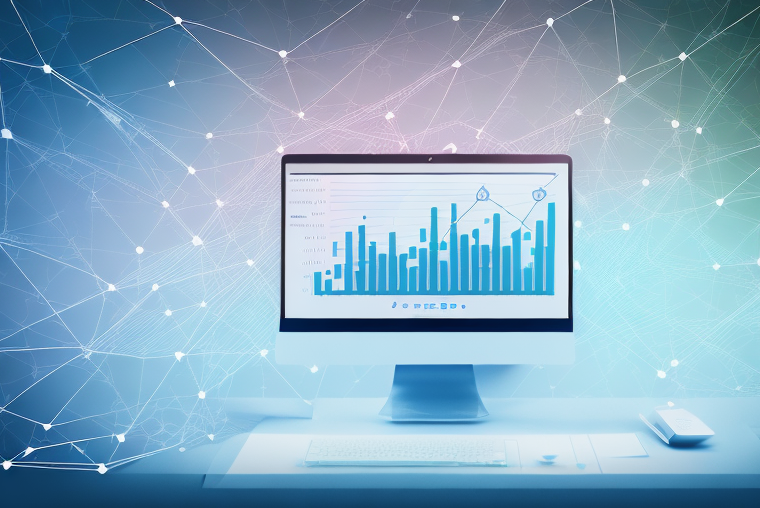Exploring the Benefits of Data and Analytics Jobs
18 Jul, 20235
Contents
- The Growing Demand for Data and Analytics Professionals
- The Role of Data in Today's Business Landscape
- Industries with High Demand for Data and Analytics Skills
- The Future Outlook for Data and Analytics Jobs
- Diverse Career Paths in Data and Analytics
- Data Analysts
- Data Scientists
- Business Intelligence Analysts
- Data Engineers
- Analytics Consultants
- Key Skills for Success in Data and Analytics Jobs
- Technical Skills
- Analytical Skills
- Communication and Presentation Skills
- Industry-Specific Knowledge
Exploring the Benefits of Data and Analytics Jobs
The world of data and analytics is expanding at an unprecedented pace. Its influence is felt across industries, as companies seek new ways to harness the power of data to drive growth and innovation.
The Growing Demand for Data and Analytics Professionals
As the importance of data-driven decision making continues to grow, there has been a significant increase in demand for skilled professionals who can analyse, interpret and make sense of data. This demand has created a thriving job market for data and analytics professionals, with salaries that are among the highest in the industry.
However, being a data and analytics professional is not just about having technical skills. It also requires the ability to communicate complex ideas in a clear and concise manner, as well as the ability to work collaboratively with other departments in an organization. Data professionals must also be able to think critically and creatively, as they are often tasked with finding innovative solutions to complex problems.
The Role of Data in Today's Business Landscape
With the proliferation of digital technologies and the increasing use of the internet, data is being generated at an unprecedented rate. Businesses have realised the power that data can offer in providing insights that can be used to drive growth, improve operations, and increase profitability. In this way, data has become a strategic asset for businesses that are looking to gain a competitive advantage.
However, with great power comes great responsibility. The abundance of data also means that there is an increased risk of data breaches and cyber attacks. This has led to the emergence of new roles within the data and analytics field, such as data security analysts and cyber security specialists.
Industries with High Demand for Data and Analytics Skills
While no industry is immune to the impact of data, some have embraced the technology and made it a core aspect of their operations. The financial services industry, for example, relies heavily on data and analytics to evaluate risk, make investment decisions, and detect fraud. Similarly, the healthcare industry has made use of data to improve patient outcomes, reduce costs, and identify new avenues for research and development. The retail sector has also adopted data and analytics to better understand customer behavior, optimize sales and improve inventory management.
However, the demand for data and analytics professionals is not limited to these industries alone. In fact, virtually every industry is now recognising the value of data and analytics, and is seeking professionals with the necessary skills to help them leverage this valuable resource.
The Future Outlook for Data and Analytics Jobs
The importance of data and analytics is only set to grow in the coming years. As companies look to gather even more data and derive insights from it, the need for skilled data professionals will only increase. In fact, according to recent research, the employment of data and analytics professionals is projected to grow at a rate of 19% through 2026, much faster than the average for all occupations.
Furthermore, the field of data and analytics is constantly evolving, with new technologies and tools emerging all the time. This means that data professionals must be committed to ongoing learning and professional development in order to stay up-to-date with the latest trends and best practices.
Overall, the future looks bright for those pursuing a career in data and analytics. With high demand, competitive salaries, and a constantly evolving field, this is a career path that offers both challenge and opportunity.
Diverse Career Paths in Data and Analytics
As the demand for data and analytics professionals continues to grow, there are an increasing number of career paths available in the field. Here are some of the most common:
Data Analysts
Data analysts are responsible for gathering, analysing, and interpreting large sets of structured and unstructured data. They are often required to use statistical tools and techniques to identify patterns and trends and make recommendations to stakeholders.
Data analysts work in a variety of industries, including healthcare, finance, and marketing. In healthcare, data analysts may analyse patient data to identify trends in treatment outcomes or to identify areas where healthcare providers can improve patient care. In finance, data analysts may analyse financial data to identify trends in market performance or to identify areas where companies can reduce costs. In marketing, data analysts may analyse consumer data to identify trends in consumer behavior or to identify areas where companies can improve their marketing strategies.
Data Scientists
Data scientists are responsible for applying advanced statistical and computational techniques to large data sets. They are required to use a range of tools and technologies, such as machine learning, artificial intelligence, and predictive analytics.
Data scientists work in a variety of industries, including healthcare, finance, and technology. In healthcare, data scientists may use machine learning algorithms to identify patients who are at risk for certain diseases or to identify areas where healthcare providers can improve patient outcomes. In finance, data scientists may use predictive analytics to identify trends in market performance or to identify areas where companies can reduce costs. In technology, data scientists may use machine learning algorithms to develop new products or to improve existing products.
Business Intelligence Analysts
Business intelligence analysts are responsible for analysing data to drive business decisions. They use a range of tools and technologies to gather, analyse, and interpret data from various sources to identify trends, patterns, and opportunities.
Business intelligence analysts work in a variety of industries, including healthcare, finance, and retail. In healthcare, business intelligence analysts may analyse patient data to identify areas where healthcare providers can improve patient care or to identify areas where costs can be reduced. In finance, business intelligence analysts may analyse financial data to identify trends in market performance or to identify areas where companies can reduce costs. In retail, business intelligence analysts may analyse consumer data to identify trends in consumer behavior or to identify areas where companies can improve their marketing strategies.
Data Engineers
Data engineers are responsible for designing, building, and maintaining the systems that store, process, and analyse data. They are required to have strong technical skills in areas such as database design, data warehousing, and big data technologies.
Data engineers work in a variety of industries, including healthcare, finance, and technology. In healthcare, data engineers may design and build systems to store and process patient data. In finance, data engineers may design and build systems to store and process financial data. In technology, data engineers may design and build systems to store and process data for machine learning algorithms.
Analytics Consultants
Analytics consultants work with clients to identify business problems and provide data-driven solutions. They draw on their expertise in data analysis, statistical modeling, and machine learning to help improve business performance.
Analytics consultants work in a variety of industries, including healthcare, finance, and marketing. In healthcare, analytics consultants may work with healthcare providers to identify areas where patient care can be improved or where costs can be reduced. In finance, analytics consultants may work with companies to identify areas where costs can be reduced or where new revenue streams can be identified. In marketing, analytics consultants may work with companies to identify areas where marketing strategies can be improved or where new marketing channels can be identified.
Key Skills for Success in Data and Analytics Jobs
While there are a range of jobs available in the data and analytics field, there are certain skills that are vital for success. In today's data-driven world, the ability to harness and analyse data is crucial for businesses to make informed decisions and gain a competitive edge.
Technical Skills
Technical skills are essential in the data and analytics field. Professionals must have a good understanding of programming languages, data structures, algorithms, and database design. They must also be proficient in using tools such as SQL, Python, and R to manipulate and analyse data. In addition, knowledge of data warehousing and ETL (extract, transform, load) processes is important to ensure data accuracy and consistency.
Analytical Skills
Professionals in data and analytics must have strong analytical skills, which are used to interpret data, identify trends, and draw conclusions. They must be able to use tools such as statistics, data visualisation, and machine learning to analyse data and draw meaningful insights. They must also be able to identify patterns and anomalies in data that may not be immediately obvious.
Communication and Presentation Skills
Data and analytics professionals must be able to communicate complex data in a simple and easy-to-understand way. They must be able to present their findings to stakeholders at all levels of an organisation and explain why certain insights are important. They must also be able to tailor their communication style to different audiences, such as executives, technical teams, and business users.
Industry-Specific Knowledge
Professionals in data and analytics must be able to understand the industry or sector in which they work. They must have knowledge of specific metrics, regulations, and trends that impact their work and be able to incorporate this into their analyses. For example, a data analyst in the healthcare industry must be familiar with HIPAA regulations and healthcare terminology.
Furthermore, data and analytics professionals must stay up-to-date with the latest trends and developments in their field. They must attend conferences and training sessions to keep their skills sharp and be aware of emerging technologies and techniques.
In conclusion, data and analytics jobs have emerged as some of the most coveted positions in the job market. The demand for such professionals is expected to increase at an unprecedented rate in the coming years, further cementing its position as a critical field for businesses. Understanding the different career paths available in data and analytics, as well as the key skills necessary for success, are essential to anyone considering a career in this field.
Whether you are a recent graduate or an experienced professional looking to switch careers, Cybernetic can help! Please get in touch.



